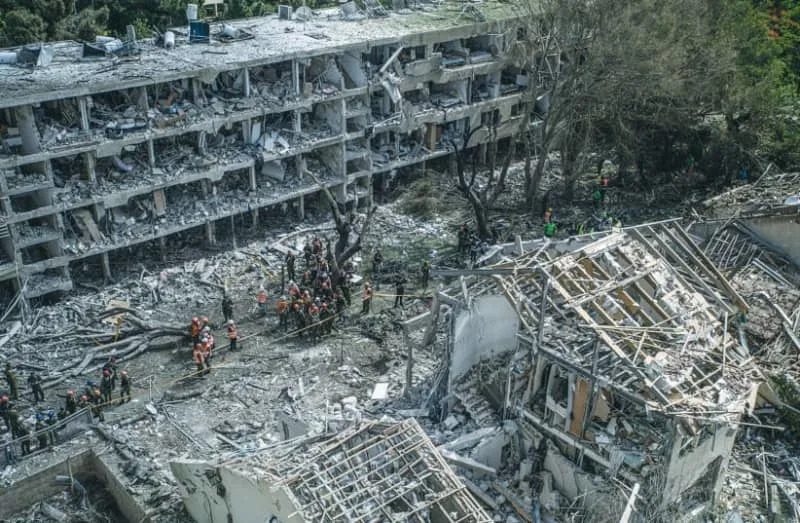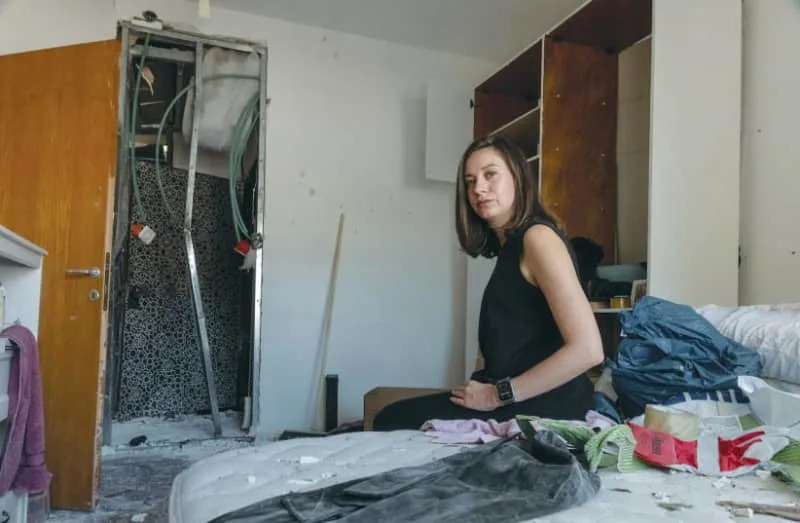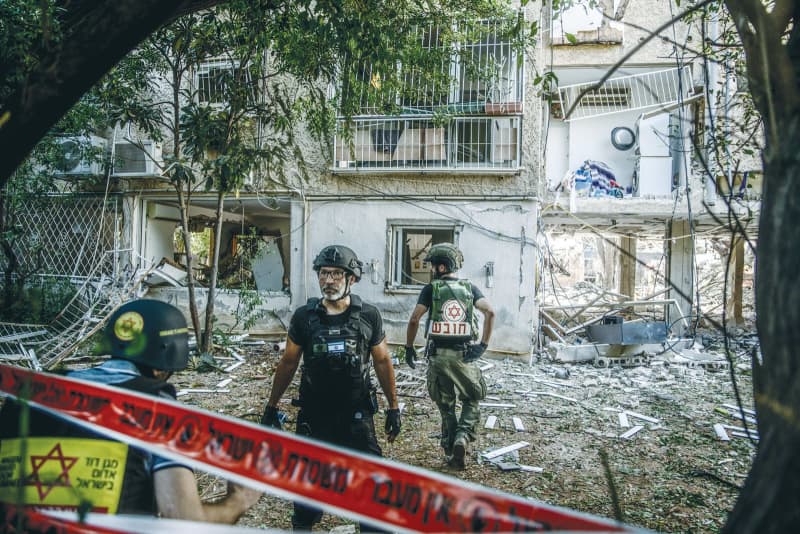The war with Iran may be over, but for victims of missile attacks, the trauma continues.
Picking up the pieces is both literal and metaphorical for Shanna Fuld. The American-born journalist spent weeks after an Iranian missile struck her apartment on June 16 wearing workers’ gloves and boots, pulling photographs from under rubble and brushing sheetrock dust off her belongings. But the real reconstruction, finding a new apartment, navigating Israeli bureaucracy, and processing the trauma, would prove far more complicated than salvaging what remained of her shattered Tel Aviv home.
One hundred meters away on Pinsker Street, Tel Aviv resident Maria faced a similar reality. Her building, adjacent to the one directly hit by an Iranian missile, was declared structurally unsafe. Authorities forbade residents from entering to retrieve their possessions, a cutoff point where one life ended and another had to begin from nothing.
“I think the uncertainty of it was the most difficult part,” Maria told The Jerusalem Post. “We didn’t know if the hotels were going to be covered for a long time. At some point, they mentioned it’s going to only take two weeks until we are obligated to move on.”
More than three months after the attack, both women have found new homes. But their experiences reveal a chaotic government response to mass displacement, marked by broken promises, bureaucratic confusion, and the extraordinary burden of paying double rent while waiting months for reimbursements that may never come.

AN AERIAL VIEW reveals the full scale of destruction, where hundreds of residents were simultaneously displaced and forced to compete for apartments in Tel Aviv’s inflated housing market. (credit: Matan Golan/Middle East Images/AFP via Getty Images)
The morning everything changed
At 4 a.m. on June 16, Maria and her partner grabbed their emergency bag – passports, money, clothes for two days, food for their dog – and fled. Her partner wore flip-flops. That single bag contained everything they would have.
For Fuld, the attack validated premonitions she had experienced for months. She had long harbored a vision of her living room window blowing in from an Iranian attack. Before leaving home for nearly two years, she would move her laptop into a protective case and rest it against the couch. When the missile hit, every piece of glass was gone. Her laptop survived. A broken pipe flooded the apartment, but the case absorbed the water.
“I really do feel that there’s my life before the rocket and my life after the rocket,” Fuld told the Post.
Both women faced grueling physical work. Fuld spent weeks doing manual labor to salvage what she could. “Everything had glass all over it; everything had sheetrock all over it,” she said.
Maria’s building presented a different challenge. Declared unsafe for entry, she couldn’t legally access her apartment to retrieve belongings accumulated over 12 years, 10 in the same apartment. “It’s only money, and you can purchase it,” Maria said. “But it’s also memories. It’s also like part of your life, something you’ve built with your 10 fingers.”
The impossible math of double rent
The financial burden came as the greatest shock. Far from providing housing assistance, the government system, through various agencies, required displaced residents to continue paying their original landlords while simultaneously securing and paying for new accommodations, all while being based in a temporary living space at a hotel.
“I had to pay my current landlord. I didn’t live in the hotel for free because I was paying my landlord,” Fuld explained. “The state, in order to circumvent having to make payouts to landlords, had residents continue to pay them.”
For Maria, who had just renewed her lease on June 16, the very day of the attack, the situation became untenable. “I’m paying for the new apartment, which started in July. And then I’m paying for the old apartment, which means I’m paying like almost NIS 13,000 for rent.”
The costs mounted: old rent, new rent, security deposit, realtor’s fee, furniture. “This changed my perspective on how much money I need to have in my bank account at all times,” Fuld said. “I need to have a hundred thousand shekels in my bank account at all times in order for me to feel safe living in this country.”
The government offered to pay a differential – the difference between old and new rent – for residents priced out by Tel Aviv’s market. But nothing was guaranteed in writing.
“There was the one big, big, big, big, big criticism I have: Nothing was given to us in writing,” Fuld emphasized. “None of us evacuees had any confidence that what we were being told verbally was going to be paid out to us. There was no date that we were supposed to expect it.”
The path to compensation required aggressive advocacy. Maria made repeated trips to a Tax Authority office after learning that someone was physically stationed there, information not readily available through official channels.
“The first time, I was like, ‘Okay, so let me know what is happening with my money.’ And then they just send another note, and they send another request,” Maria recounted. “I’m telling them, listen, my previous landlord is taking down the checks. He’s taking down the checks, and I don’t know when you’re going to pay me.”
On her third visit, Maria reached her breaking point. “I’m going there, and I’m screaming until I get answers, screaming and crying,” she said. “And then I just got my answer, and a few days afterwards I had the money in my bank account.”
She reflected: “If I didn’t scream at them, I wouldn’t get [the money]. I just wouldn’t. If you don’t scream and you don’t raise your voice and you don’t panic, they won’t move.”
“It sucks to say it, but you have to behave like that to get it,” she added. “I’m not that kind of person, but I just understood that if I wanted to get something out of it, I had to scream and cry.”
Fuld experienced similar frustrations. Government ministries called repeatedly, asking what she needed. She told them: a bed, because she was forced to leave the hotel before she could furnish her new apartment.
“I got multiple calls from the state asking me what I needed. I told them what I needed. I needed a bed,” she said. Two days later, they called again, asking the same question. “They said, ‘We’re going to get back to you in a few hours and solve this issue.’ Never heard from them again.”
The pattern repeated with requests for trauma therapy. “They asked me if I needed a social worker. I said, ‘Yes.’ Never heard from any social worker. I asked for a social worker three times. Never got it.”

Shanna Fuld surveys the destruction of her apartment on Ben Yehuda Street in the aftermath of the June 16th Iranian missile strike. (credit: Chen Schimmel/The Jerusalem Post)
The contract Catch-22
Fuld’s situation was complicated by her lease structure. After three years in her apartment, the last six months had been month-to-month because her landlord was selling the property. When she submitted her contract, officials told her it wouldn’t be accepted.
“They told me that I had chutzpah for staying in the hotel and that because I didn’t have a one-year lease, I was being [treated] extra nice and extra tended to by the state,” she recalled.
Faced with paying double rent indefinitely with no guarantee of reimbursement, Fuld stopped paying her old landlord after August. “I said, ‘Sorry, but not sorry. I have to move on, and I cannot pay two rents at risk that the government would throw my contract in the garbage.’”
Her new apartment costs NIS 1,100 more per month, a differential she now pays entirely out of pocket. “I spent a lot of time trying to find the same rent that I paid before, and I just couldn’t find it because I’ve been priced out.”
When compensation for the evacuees eventually arrived, it came without warning. Maria received the maximum amount for a couple – NIS 85,000 for all household contents – 45 days after submitting her claim.
“Nobody talked to us before. We didn’t know how much we were getting, if we were getting it, when we were getting it,” she said. “By that time, we were already in a new apartment, and we had to get stuff.”
While Maria acknowledged the payment covered immediate needs, she noted its inadequacy given 12 years of accumulated possessions. For clothing alone, she estimated couples would need NIS 10,000 or more.
She also had to negotiate compensation for her destroyed car. After arguing, she received an additional NIS 1,000. “This is basically how things are running in Israel,” she said. “You have to scream and cry for everything, and then eventually you will get it.”
Fuld’s one check from the government arrived nearly three months later. “It helped me buy a little furniture,” she said. “But everything that I needed, I needed it months ago.”
Her partner organized an independent fundraiser that provided crucial support. “Without having that cushion, it would have been very hard for me because I was paying two rents.”
One theme that constantly came up was the uncertainty evacuees faced when dealing with government offices and ministries. Residents faced constantly shifting bureaucratic requirements. Maria described contradictory instructions about submitting documentation.
“I was running on adrenaline,” she reflected. “And now I feel like I don’t even know how to not run on adrenaline.”
The aftermath is manifesting physically. “I’m having anxiety attacks that are kind of recent because now I think my body is done doing the heavy lifting,” she explained. “I’m having a hard time breathing. I can’t catch my breath.”
“They kept on moving back and forth from, ‘Submit documents by the system’ to ‘No, don’t submit it by the system, but fax it.’ We haven’t used fax for ages. Then it was email, but they don’t answer emails, and there is no one to talk to,” she said.
The lack of clear protocols, nearly two years into the war, particularly frustrated her. “We are almost two years into the war, and nothing is clear. What period of time do we have to stay in the hotel? What are the compensation rates? Nothing is clear.”
As an immigrant, Fuld faced additional difficulties. “They’re calling me in Hebrew,” she said. “If you’re trying to help somebody because you know that they’re an olah, send an English speaker to talk to them when they’re in the middle of a traumatic episode.”
Amid the chaos, there was some praise set aside for the Tel Aviv Municipality. “I think the city of Tel Aviv did the best that they could. They really advocated for us, and they sent social workers to the hotels,” Fuld said.
She learned there was “a battle between the city and the state” over hotel stays. “The city of Tel Aviv was advocating for residents to be able to stay longer. And the government, because they’re the ones paying, they were trying to get us out.”
The emotional toll
Three months on, both women are confronting the psychological impact. Fuld’s freelance journalism career ground to a halt compared to her usual pace of work.
Maria is beginning trauma therapy, too, she shared with the Post. “Whenever you realize that you’re done fighting for everything, you understand how much damage it caused you,” she explained. “You stop running, and then you just realize, ‘That’s what I’ve been through.’ My whole life was basically destroyed, and I had to start from scratch.”
She identified the loss of control as particularly difficult. “It was not my choice how I ended up waking up some random day, and my whole life was being destroyed, and it’s out of my control.”
The threat of future attacks compounds the trauma. “Just having the thought of having another attack coming over makes me want to purchase a one-way ticket to go somewhere and just not be here anymore,” Marie lamented.
The experience changed how Fuld relates to Israel. Arriving at 24, too old for mandatory army service, she long felt guilt about not serving. “I really felt that my pen was my way of serving the country,” she said.
“I actually feel that I’ve been initiated into Israeli culture. I really feel very Israeli. Everybody knows somebody who’s had something happen to them or had somebody die or somebody got injured or somebody has PTSD from this war.”
Protocol calls
Both women emphasized that their experiences reflect a broader systemic failure. “Everybody thinks that following people’s homes getting bombed, the government kind of held their hand,” Fuld said. “People even asked me if I’m living in government-assigned property.”
Maria’s central message focused on the need for established procedures. “The government should have protocols. We are two years into this war. There were hundreds of thousands of refugees who lost their homes. There should be a protocol about that,” she said.
“There shouldn’t be this Israeli mode of nothing is written down, and you have to fight for everything and scream for everything. Please get us something super coherent. At least it will be written in our blood, but something for the next people to experience something like that. And unfortunately, I’m pretty sure there will be some other people experiencing that in Israel.”
As Fuld continues unpacking boxes and attempting to restart her career, she reflects: “The ideas are good. The idea of giving people a differential so that they could have a similar standard in a new apartment is nice. But you can’t make people wait three to six months to get a reimbursement. Who has that kind of cash to lay out?”
For Maria, recently receiving her full 12 months of rent differential payments, the relief is tempered by what it took to get there.
“I could finally breathe,” she said. “And now I am actually starting therapy. Because whenever you realize that you’re done fighting for everything, you understand how much damage it caused you.”
